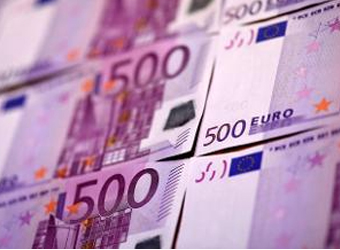The euro firmed to one month-highs against the dollar in Asian trading on Monday, after some European Central Bank policymakers raised the possibility of hiking interest rates before bond purchases end.
The euro was up 0.2 percent at $1.0699, after rising as high as $1.0701, its highest level since February 9.
Some members of the ECB’s Governing Council discussed the possibility of higher interest rates at last week’s policy meeting, but talk on the issue was brief and did not receive broad support, said two sources familiar with the discussion.
The euro’s gains were limited by expectations that the U.S. Federal Reserve would decide to raise interest rates at its two-day policy meeting ending on Wednesday, after U.S. employers hired workers at a robust pace in February.
The headline figure surpassed expectations and wages also rose, though by less than some economists expected.
Overall, the non-farm payrolls report reinforced market expectations that the Fed will hike interest rates this week despite slowing economic growth.
Wage growth rose 0.2 percent, falling short of an expected 0.3 percent increase, which caused U.S. Treasury yields to recede from last week’s 12-week highs.
The benchmark 10-year U.S. yield was last at 2.580 percent in Asian trading, compared to its U.S. close on Friday of 2.582 percent.
It was well below Friday’s high of 2.624 percent, which was its highest since December. Fed fund futures prices showed investors pricing in more than a 90 percent chance of an increase in U.S. overnight interest rates, according to CME Group’s FedWatch tool.
With a rate increase so broadly priced in to market expectations, investors have moved on to the next question of whether the Fed will be able to sustain its pace of hikes and also increase rates in its June and September meetings.
“Everyone wants to see the economic projections of FOMC members, to gauge whether they will indeed stick to a path of raising interest rates in both June and September,” said Ayako Sera, market strategist at Sumitomo Mitsui Trust Bank in Tokyo.
A Reuters poll of 23 primary dealers showed a dozen of them expected the Fed to raise rates to 1.00 to 1.25 percent by its June meeting, while ten of them expected a rate increase by its September meeting.
As market participants ponder the outlook for future monetary policy moves, day-to-day trading this year has vexed some investors. “It’s hard to pick one specific theme in a market like this,” said Bart Wakabayashi, branch manager for State Street Bank and Trust in Tokyo.
“It’s hard to find trends, so I think people are mostly just playing ranges, technicals and momentum,” he said.
The dollar edged down 0.2 percent against its Japanese counterpart to 114.66 yen, below Friday’s high of 115.50 yen, which was the highest since January 19.
Speculators had boosted bullish bets on the U.S. dollar in the week through March 7, lifting net longs to their highest level since early February, according to Commodity Futures Trading Commission data released on Friday and calculations by Reuters.
The dollar index, which tracks the U.S. currency against a basket of six major rivals, slipped 0.1 percent to 101.13, its lowest since Feb. 28.
Sterling added 0.2 percent to $1.2189, moving away from last week’s eight-week lows.
The pound lost almost one percent against the euro on Friday after the ECB news.
The single currency was last up 0.1 percent at 87.83 pence after rising as high as 87.86 pence, its loftiest peak since January 17.
Source: Reuters


